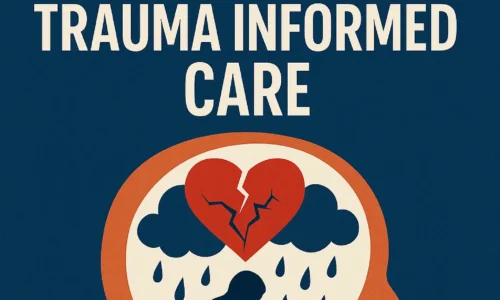Program Overview
The Professional Diploma in Trauma-Informed Care (PDTIC) is a transformative learning experience designed for dedicated professionals who want to make a meaningful difference in the lives of individuals and communities affected by trauma.
This comprehensive program blends theory, practical skills, and real-world application, empowering you to lead trauma-informed change across diverse sectors. Whether you work in healthcare, education, social services, community development, law enforcement, or faith-based organizations, this diploma will elevate your expertise and equip you to champion healing and resilience.
Over the course of 6 to 12 months, you’ll explore culturally relevant practices, learn to engage communities effectively, and develop collaborative solutions that foster equity and well-being. With guidance from expert faculty and a supportive network of peers, you’ll gain the confidence and tools to design, implement, and evaluate trauma-informed initiatives that truly make a difference.
This is more than a program—it’s a call to action to lead, innovate, and advocate for a more compassionate, just, and trauma-sensitive world.
Are you ready to join a community of change-makers committed to transforming lives through trauma-informed care? 🚀✨
Features
- The Professional Diploma in Trauma-Informed Care (PDTIC) is uniquely designed to provide practicing professionals with an immersive, flexible, and transformative learning experience. Here’s what makes this program stand out: ✅ Advanced-Level Curriculum This program goes beyond the basics to explore trauma-informed care principles across multiple sectors—including healthcare, education, social services, community development, law enforcement, and faith-based organizations. ✅ Culturally Relevant Content The course integrates real-world case studies, local examples, and culturally sensitive practices to ensure relevance for professionals working in African and global contexts. ✅ Multi-Sector Collaboration Participants gain insight into building partnerships and fostering collaboration across sectors to design and implement trauma-informed systems that are holistic, sustainable, and impactful. ✅ Flexible Hybrid Learning Enjoy a blend of online asynchronous learning and live virtual sessions that fit around your professional commitments, with optional in-person workshops for added interaction and networking. ✅ Interactive, Practical Focus Experience hands-on learning through role plays, group discussions, and collaborative projects that reinforce theory with real-world practice. ✅ Capstone Project Demonstrate your expertise by designing and presenting a comprehensive trauma-informed initiative tailored to your sector or community—showcasing your readiness to lead change. ✅ Expert Faculty and Mentors Learn from seasoned professionals and thought leaders who bring a wealth of experience in trauma-informed care, community development, policy, and advocacy. ✅ Career and Leadership Development Enhance your professional credibility and prepare for leadership roles in trauma-informed practice, program development, and policy advocacy. ✅ Monitoring and Evaluation Skills Gain valuable skills in assessing the impact and sustainability of trauma-informed programs using robust monitoring and evaluation frameworks. ✅ Community of Practice Join a dynamic network of peers and mentors, fostering ongoing collaboration and support even beyond the completion of the program.
Target audiences
- This program is designed for professionals and leaders in: • Healthcare (e.g., doctors, nurses, mental health practitioners) • Education (e.g., teachers, school counselors, administrators) • Social Services (e.g., social workers, case managers) • Community Development (e.g., NGO staff, community organizers) • Law Enforcement and Justice Systems • Faith-Based Organizations • Policy and Advocacy Roles
Requirements
- The Professional Diploma in Trauma-Informed Care (PDTIC) is designed for practicing professionals who wish to deepen their expertise in trauma-informed care, enhance their leadership skills, and drive meaningful change within their organizations and communities. This program is not intended as an entry-level course for individuals seeking employment but rather for those already engaged in professional practice across healthcare, education, social services, community development, law enforcement, or related fields. Eligibility Requirements: ✅ Professional Qualification: Applicants must hold at least a basic qualification (certificate, diploma, or degree) in their respective field (e.g., healthcare, education, social work, counseling, community development, law enforcement, or a related discipline). ✅ Professional Experience: A minimum of one year of relevant professional practice is recommended to ensure participants can effectively apply trauma-informed concepts in real-world settings. ✅ Commitment to Learning: Participants should be motivated to engage in advanced learning, reflective practice, and collaborative work with peers from diverse sectors. ✅ Access to Technology: Basic proficiency in using computers and internet-enabled devices is required to access online learning platforms, participate in live sessions, and complete assignments. Recommended Prerequisites (Preferred but not mandatory): 🔹 Experience working directly with individuals, families, or communities affected by trauma or adversity. 🔹 Familiarity with basic concepts of mental health, community development, or social work. 🔹 Interest in leadership, advocacy, or program development within their field. Additional Notes: This program is designed for professionals looking to enhance their knowledge and practice rather than for those seeking to enter the workforce. Participants should be prepared to engage in interactive discussions, case studies, and collaborative projects that draw on their professional experiences. The program emphasizes application of trauma-informed care principles across sectors, including healthcare, education, social services, community development, law enforcement, and faith-based organizations.
Curriculum
- 1 Section
- 0 Lessons
- 20 Weeks
- Modules0
FAQs
Instructor
